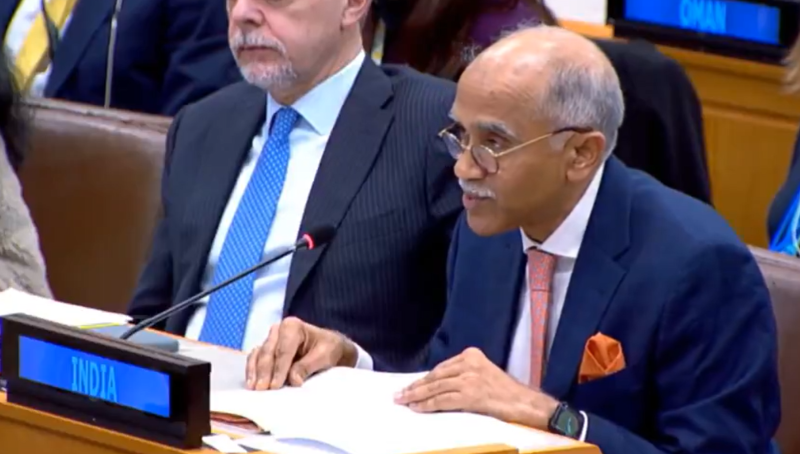 India's Permanent Representative to the UN, Ambassador Parvathaneni Harish delivering his address. Photo courtesy: Screen-grab from X video
India's Permanent Representative to the UN, Ambassador Parvathaneni Harish delivering his address. Photo courtesy: Screen-grab from X video
Pakistan violated Indus Waters Treaty spirit with wars and terror attacks for decades: India at UN
New Delhi : India on Saturday accused Pakistan of violating the Indus Waters Treaty with wars and terror attacks for decades, slamming the hostile neighbour over the controversy regarding the suspension of the agreement.
India's Permanent Representative to the UN, Ambassador Parvathaneni Harish said this at the United Nations in the backdrop of New Delhi's diplomatic strike on Islamabad by suspending the treaty in the wake of the Pahalgam terror attack.
Harish said, "India entered into the Indus Water Treaty 65 years ago in good faith. Pakistan has violated its spirit by inflicting three wars and thousands of terror attacks on India. More than 20,000 Indian lives have been lost, the most recent being the terror attack in Pahalgam. India has shown extraordinary patience and magnanimity throughout.
"Pakistan's state-sponsored cross-border terrorism seeks to hold hostage the lives of civilians and economic prosperity. In these 65 years...technology for dam infrastructure has transformed to ensure safety and efficiency of operations and water use. Some of the old dams are facing safety concerns."
#WATCH | New York | At the Arria Formula Meeting, on the Indus Water Treaty, Permanent Representative of India to the UN, Parvathaneni Harish, says, "India entered into the Indus Water Treaty 65 years ago in good faith. Pakistan has violated its spirit by inflicting three wars… pic.twitter.com/DCFVLbi7Rx
— ANI (@ANI) May 24, 2025
"Pakistan has continued to block any changes to this infrastructure permissible under the Treaty. In 2012, terrorists attacked the Tulbul Navigation Project in J&K, continuing to endanger the safety of our projects and civilian lives. India has asked Pakistan to discuss the modifications of the Treaty in the past 2 years.
"But Pakistan’s obstructionist approach continues to prevent the exercise... It is against this backdrop that India has announced that the Treaty will be in abeyance until Pakistan credibly and irrevocably ends its support for cross-border terrorism. It is clear that it is Pakistan which remains in violation of the Indus Water Treaty..," he added.
After Islamabad's plea to the Jal Shakti Ministry asking India to reconsider the suspension decision of the Indus Waters Treaty, Jaishankar had earlier this month said the same "will continue to be kept in abeyance until cross-border terrorism by Pakistan is credibly and irrevocably stopped".
Pakistan, which depends heavily on the waters of the Indus both for agriculture and drinking, had written to the Jal Shakti ministry asking that India reconsider the matter.
Significance of the Indus Water Treaty
For over six decades, the Indus Waters Treaty (IWT) has been crucial in facilitating peaceful water sharing between India and Pakistan, even during times of heightened political and military tensions.
The treaty favours Pakistan, which is the downstream country, allowing it access to approximately 80% of the Indus River system's waters.
The Permanent Indus Commission, the body responsible for resolving disputes, continued its functions even during the wars of 1965 and 1971, demonstrating the resilience of the treaty framework.
Despite facing multiple terror attacks, including the 2001 Indian Parliament attack and the 2019 Pulwama attack, India had not withdrawn from the treaty until the Pahalgam attack.
Pahalgam attack
Twenty-six tourists, mostly Hindus, died after terrorists identified them as non-Muslims and gunned them down in Baisaran meadows, a popular destination in Pahalgam.
World leaders, including US President Donald Trump and Russian President Vladimir Putin, condemned the attack.
The terrorists, who were apparently in camouflage, reportedly asked the victims to chant Islamic verse, pull down their pants to check circumcision in a bid to confirm their Hindu identities before gunning them down. Two among the dead were non-Muslim foreigners.
Top Headlines
-
News
Sheikh Hasina attacks Muhammad Yunus from first public address in Delhi, urges uprising in Bangladesh
January 23, 2026
-
News
Top Maoist leader with 2 crore bounty among 16 eliminated in major Jharkhand encounter
January 23, 2026
-
News
Russia, US, Ukraine to hold first trilateral talks in UAE, Zelensky announces
January 22, 2026
-
News
Supreme Court slams Maneka Gandhi over remarks on stray dogs case, flags possible contempt
January 20, 2026
-
News
'India-EU trade deal nears finish line': European Commission Prez at Davos, calls it mother of all deals
January 20, 2026
-
News
Nitin Nabin becomes BJPs youngest president ahead of key assembly polls, PM Modi calls him my boss
January 20, 2026
-
News
PM Modi calls Nitin Nabin my boss as he takes over BJP leadership
January 20, 2026
-
News
David Beckhams son drops bombshell, accuses parents of trying to ruin his marriage
January 20, 2026
-
News
Mamata Banerjee appeals to CJI for protection from targeting by agencies amid ED row
January 18, 2026
-
News
Trump tariff bomb on Iran trade: Tharoor flags existential crisis for Indian exporters
January 15, 2026





